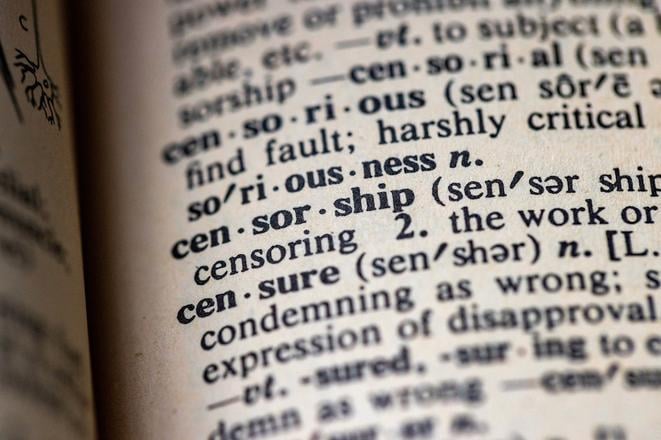Once upon a time, during a dreary winter in Žilina, I started reading the Oxford English Dictionary (OED). It happened to be the only book in my tiny collection, besides Finnegan's Wake, that I hadn't re-read until the cover fell off.
Dictionaries, as everyone else except me already knew, are full of good comedy. From Boetia (a city in ancient Greece renowned for the stupidity of its inhabitants) to borborygmus (the rumbling of gas in the intestines, pl. borborygmi), the OED lays it down with a comically straight face ("bullshit: [mass noun] stupid or untrue talk or writing.")
Much of that humour, unfortunately, never makes it to the Slovak-English dictionary (slovník) put out by the Slovak Academic Press in 1997. But don't be put off - just in learning the vocab you need to explore the dictionary, you will encounter a host of expressions that also apply to basic life situations.
Start with slovo (word). You can hľadať slovo v slovníku (look a word up in the dictionary) or brať niekoho za slovo (take someone at their word). You can give someone your solemn word (dať niekomu svoje čestné slovo), have the floor (mať slovo) or have the last word (mať posledné slovo). Even if you are never able to put your feelings into words (vyjadriť pocity slovami) in Slovak, by keeping your word (dodržať slovo) you will command respect that even a large vocabulary (bohatá slovná zásoba) can't buy.
It helps if you know what part of speech you're dealing with. A noun in Slovak is podstatné meno, meno also meaning a first name (priezvisko is surname). Podstatný is a useful word, meaning significant, essential, or relevant. The podstatná príčina is the root cause, a podstatný rozdiel a fundamental difference. This isn't stupid or untrue talk or writing; je to v podstate pravda (it's basically true).
Here's an example of a truly podstatné meno, although not one you'll find in the dictionary. On a recent trip from Bratislava to Vienna, the bus I was riding in was held up by the Austrian border guards, who decided to give one passenger a hard time about her passport. As the minutes dragged by, several older ladies at the back of the bus began shouting aggressively at the driver to leave the young woman behind, as they were in a hurry.
"Cépečkári," said the woman in the seat beside me. The word, which means something like "peasants", is derived from the abbreviation CP of the word cezpolní, "across the fields". Back when all Slovaks lived in villages separated by fields, strangers were lumped together as people who came from somewhere across the fields. For Bratislavans today, people who live in the country, or especially people who behave uncouthly, remain cépečkári, which is even better than sedlák (redneck) as a putdown.
Adjectives (prídavné meno) are also interesting, prídavné being related to the verb (sloveso) pridať, to add, as in the meaning adjectives add to whatever is fundamental in life. Pridať also means to speed up or accelerate, while pridať sa k niečomu is to join something or become an ally. Pridaj sa k nám, come and join us, was a phrase I heard often in Žilina from people in pubs who felt pity for the solitary, bearded loser hunched over his OED.
Years later, in another pub, I heard a drunkard sneering to himself at a pair of men in suits who were sitting at a nearby table. "Vykravatovaný," was the adjective he chose, freighting it with all his resentment of their apparent wealth and sobriety. Again, not a dictionary word, but derived from kravata, a tie, and meaning something like "all gussied up" (i.e. to make oneself more attractive, especially in a showy way). As if the men's ties were the embodiment of the social gulf that separated them from the mumbling ožran (drunkard).
An adverb is a príslovka, dangerously close to príslovie, a proverb. Slovak has many beautiful proverbs, such as nešťastie nechodí po horách, ale po ľuďoch (unhappiness doesn't walk through the hills, but through people). It also has its share of dumb sayings, as President Rudolf Schuster once reminded us in comparing the media to women: "Život s nimi je ťažký, ale bez nich nevieme byť" (can't live with 'em, can't live without 'em). Perhaps it was an example of the president's proverbial humour (jeho príslovečný humor), or the proverbial simplicity (príslovečná prostosť) of his speech. Beware of that prostosť, by the way; it's dangerously close to sprostosť, or stupidity, and is often hard to tell apart.
In the end, much of what you'll be doing with the Slovak-English dictionary is looking for meaning (význam), asking yourself, "Čo to znamená?", what does that mean? Nemá to význam (it means nothing, makes no sense, has no importance) is what many Slovaks are saying these days, but don't let that come between you and your slovník. Vzdelanosť sa chváli sama (education is its own reward), and may even afford you a few laughs.
Better than Finnegan's Wake, at any rate.
This article was originally published by The Slovak Spectator on February 3, 2003. It has been updated to be relevant today.


